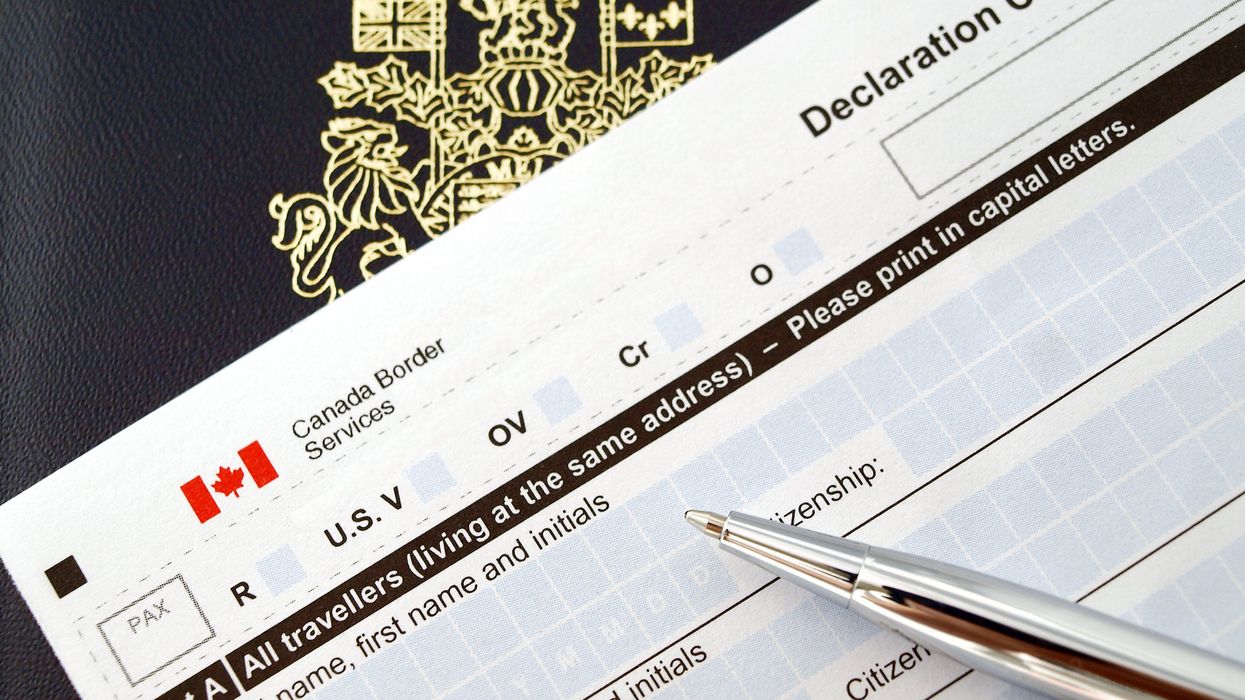The government has issued new travel advice for Canadians going abroad this May long weekend
Here's how to avoid summer travel chaos — and new border surtaxes. 😬👇

The CBSA is warning Canadians about possible delays and fines at the border this travel season.
The May long weekend is almost here to kick off the summer travel season, and if you're planning to head out of the country anytime soon, there's some new travel advice Canadians should know.
The Canada Border Services Agency (CBSA) just dropped fresh travel warnings and tips to help you avoid long waits, declare properly and even dodge a hefty new surtax at the border.
With tensions between Canada and the U.S. at an all-time high and ominous warnings about increased scrutiny from border officials, you'll want to be extra careful and ensure you have all your ducks in a row before travelling to the U.S. this spring and summer.
Whether you're flying or driving, these travel advisories are meant to keep things moving smoothly at the border — and make sure you don't accidentally bring in something that could get you fined (or worse).
Expect busy border crossings
The CBSA says the Victoria Day long weekend is one of the busiest times for travel. And with Memorial Day also coming up in the U.S., that's a double whammy for traffic. If you're driving across the Canada-U.S. border, try to cross early in the morning to skip the longest wait times.
Holiday Mondays are usually the busiest, so if you can, avoid crossing on May 19. The CBSA also suggests checking real-time border wait times online before you go. If the crossing you're headed to is backed up, consider switching to a different port of entry that might be less busy.
Also, don't forget to check the hours of operation — not all ports are open 24/7. You can use apps like Google Maps or Waze to explore different driving routes and find the fastest option in real time.
Have your documents ready
Border officers have one big ask: be ready. That means having your travel documents — like your Canadian passport, NEXUS card and/or permanent resident card — handy before you roll up to the booth.
Quick access to your documents will make processing faster and help you get where you're going with fewer delays.
Leave these items at home
The CBSA is reminding Canadians what not to pack. That includes firearms, weapons and restricted drugs, including Cannabis. Yes, even if cannabis is legal in Canada, taking it across the border — in any form — is still a criminal offence unless you have special authorization from Health Canada.
Before you head out, take a few minutes to check the CBSA's list of restricted and prohibited items. It also includes things like certain foods, plants and consumer products.
Bringing in something that's not allowed — even by accident — could lead to fines, seizures or even prosecution.
Know the rules about what you're bringing back
According to the CBSA, if you're shopping during your trip, there are some important rules around what you can bring back into Canada without paying duty or taxes.
Canadian residents get a personal exemption — which lets you bring back certain goods (including alcohol and tobacco) up to a specific value without extra charges. But if you go over that limit, you could be on the hook for a 25% surtax on top of the usual duties.
This surtax applies to certain U.S. goods over the exemption limit, so it's worth checking the full list of affected products on the CBSA site before you load up your trunk. And keep your receipts — you'll need to tell the officer exactly how much you spent, in Canadian dollars.
Use Advance Declaration if you're flying
If you're flying back into the country, you can save time by filling out your customs and immigration declaration online — up to 72 hours before you land.
Advance Declaration is available at major airports across Canada. It's totally optional, but the CBSA says it speeds things up significantly at the kiosk.
Travelling with kids? Bring a letter if they're not yours
Planning a trip with your niece, nephew or your kid's friend? The CBSA recommends carrying a consent letter from their parent or legal guardian if they're not your own child or you don't have full custody.
Border officers are trained to look out for missing children, and without that letter, you could face some serious questioning at the border. The letter should include the parent or guardian's full name, address and phone number — and ideally be notarized.
Be honest and ready to declare
When you return to Canada, you're responsible for everything you bring with you. If you're driving, that includes everything inside your vehicle. The CBSA urges travellers to be upfront and honest with officers — and ask questions if you're not sure what needs to be declared.
The agency says the best way to avoid delays is to declare everything and answer truthfully. It's not just about following the rules — it can also save you time and money.
Before you get going, check out our Responsible Travel Guide so you can be informed, be safe, be smart, and most of all, be respectful on your adventure.
AI tools may have been used to support the creation or distribution of this content; however, it has been carefully edited and fact-checked by a member of Narcity's Editorial team. For more information on our use of AI, please visit our Editorial Standards page.
- Canada just updated its travel advisories for India & Pakistan with urgent warnings ›
- Most Canadians don't feel safe travelling to the US but the wariest province isn't Ontario ›
- Canadians now have to pay a new tax at the US border & on packages — Here's how it works ›
- Canada updated its US travel advisory again with ominous warnings: 'You could be detained' ›